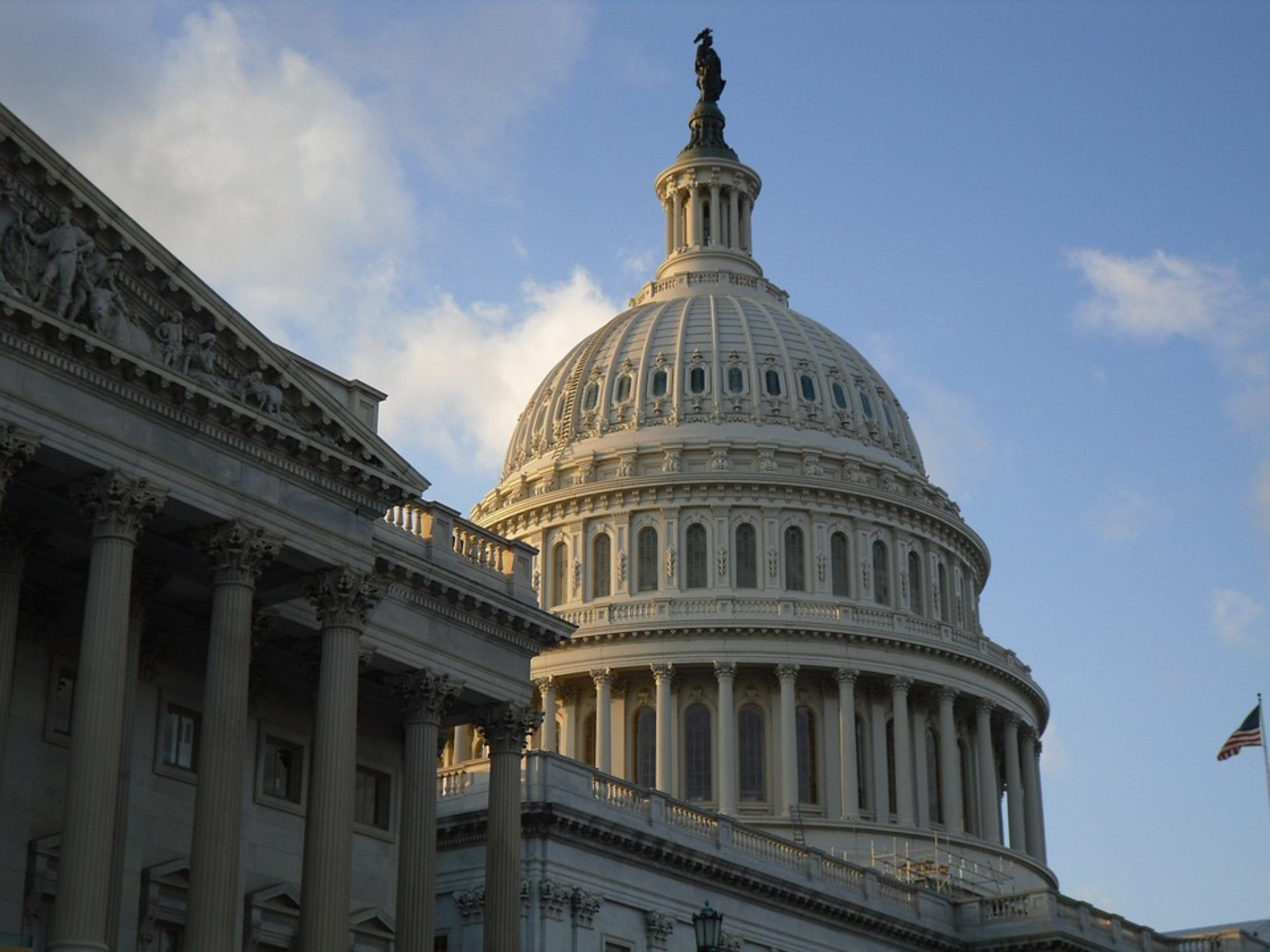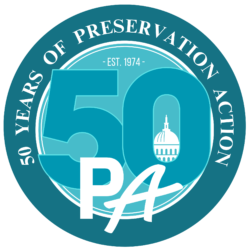Anyone interested in advancing a cause, preservationists included, has to get their feet wet in politics at some point. One of the most direct ways to present yourself and your organization as relevant, and to promote preservation as an issue people care about, is to put together a candidates forum or its less time-intensive equivalent, the candidate’s survey.
Learn the Value of Candidate Forums and Surveys, both:
Tips for Organizing a Candidate Forum
1
Pre-Planning
Staging a candidates’ forum is not rocket science. The effort is, however, greatly improved by planning well in advance. Even before candidates announce their interest in running, you can discuss what questions you’d like answered with your community group, local organization, and governing board. To know what questions would be of greatest interest to the candidates, attract an audience, be of mutual interest to other community groups, and those likely to attract press attention or invite quotes in the local newspaper, read your local papers carefully.
It’s also important to understand your own capacity. If you are a staffer at a small organization, you may not have time to put on a forum on your own. If this is you, you should start discussing the idea of partnering long before you’re at the official planning stage. Getting even one preservation-specific question in somebody else’s forum is a good start. If you are working with or for a larger organization, you may still want to partner for the aforementioned reasons. Partnerships will mean that you will not get to dominate the discussion, but this is not necessarily a bad thing. A few good questions sequenced within a number of other good questions related to the public good is, as mentioned above, helpful in demonstrating relevance.
You should also consider developing a relationship with a local organization dedicated to voter education in general, like the League of Women Voters. The League may be more interested in preservation than you’d think and very interested in helping you in a number of ways. Your local chapter may have a committee focused on urban issues or something clearly related to preservation – they may help shepherd your request for help through the organization.
2
Scheduling Your Date
You should decide early on whether your forum happens before or after the primary. Before the primary, you’ll have more people to coordinate, and your message may be diluted by less-than-professional candidates. You’ll also have less time per question because there are more people on stage. Having the forum early on in the race may mean people forget about it during election time – although you can remind people you conducted a survey or forum via email and on your website. But you may have a greater chance of securing a forum if you schedule early.
After the primary, you event will be more focused, but you will also be competing with more forums. The news of your forum may also be more difficult to “sell” as you near the actually election given the snowballing momentum of the political season.
You also may have no choice – you may have a hard time booking a time and a venue — but given the choice, you should consider which timing seems right for you. It may be that the forum coincides with another event you’re staging or may be an opportunity to highlight something of immediate concern that can’t wait until after the primary.
3
The Space
Where you hold the event says something about your group and your cause. You also don’t want a space so large that a small turnout will be dwarfed. Spaces set up with stages are preferable to general-purpose spaces. Consider a space that supports plays or smaller theatrical productions. These will be well set up in advance for good production values – as opposed to church basements, cafeterias, and other big spaces with little aesthetic appeal. These will also be well set up to accommodate important elements like sound, lighting, cameras, and good sight lines.
If you can’t secure a space like this, be sure to figure the cost of all these technical elements into your total budget.
Even if the mass transit system in your town is good, you’ll still want to consider parking. Planning an event in a space already designed for productions generally solves this practical issue.
4
Your Moderator
A good moderator is key to a successful forum. Professionals with experience in television news are popular favorites for forums and other moderated events. Ideally, who ever you choose would be well versed in the issues to be discussed – not just a talking head asking questions who can’t respond quickly to a time-consuming tangent. But, you may not be fortunate enough to have a television personality agree to host your event and submit to a primer in preservation issues.
A dynamic executive director, either of your organization or an allied group, would be able to do this, but would not (generally) have the celebrity appeal of someone in the media. The key is finding someone who can command attention without drawing too much attention away from the candidates, who can delicately reign in digressions, and who has some grasp of the issues.
5
Your Budget
A candidates’ forum could involve very little cash outlay. There are some associated costs like printing take-away literature for the event, but if you can get a space donated, all you need is good time management and a thoughtful group of planners. It may be that your cause fits in with the interests of a group with a great venue (like a historic small theater or movie house) who might be interested in donating a space, but keep in mind you may also need to pay for security or other venue staff who handle lighting and sound, among other practical concerns.
6
Printed Materials
Like lobbying, it is important to have extensive amounts of research and insight condensed into very few words when helping candidates prepare for your event. You should be as scrupulously objective as possible – providing facts, figures and a few examples to elaborate on a general issue you plan to address during the forum.
Providing candidates with the questions you’ll be asking them in advance with “cheat sheets” including contact information for key people like your town’s preservation officer or chief preservation planner is good manners and provides good content for your website, your members, and for the audience attending your forum. The brief will help your candidates feel more comfortable with the issues and allow for more intelligent informed responses. These briefs also, of course, help educate your candidates should they not understand the issue.
7
Advertising Your Forum
Press releases are not the only way to alert the media to your event. You can send out a press advisory long before the date of the event once you have this nailed down. You can also build up interest in the event through email within your own network and in the networks of partner organizations. Be sure to post your event on neighborhood calendars or any calendar that seems relevant to the issues you’ll be airing publicly. Neighborhood newspapers with small circulations (approximately 5000) may not have the broad readership you want but would be much more interested in promoting your event if there’s a direct connection (or close enough) to issues their neighborhood finds important.
Developing a graphic for the forum that illustrates a theme or plays on the civic significance of voter education could help promote your event beyond the usual group of people already sold on preservation. This helps brand the event and contributes to its production values (so long as the graphic is a good one).
8
The Day Of
Be sure you have some helpers who know what the candidates look like. Be sure to print signs identifying the candidates that can be seen from the back of the room by someone without supernatural vision. Have a sign-in sheet in the front near the entry next to a person assigned the task of getting the audience to sign in. Have all your briefing materials prepared for the candidates available for anyone in attendance. Don’t forget to bring brochures promoting your organization. Tape record the forum. If you have the equipment, videotape the forum. Take photos of the event and be sure to have photographs of the individual candidates, in focus, preferably not embarrassing ones.
At the end of the introduction of the candidates and at the closing be sure to reiterate the importance of signing in.
9
Afterward
Complete transcriptions of the forum may or may not be published in their entirety on your website, but typing up the whole thing is good form – a valuable piece for the archives. If you can complete a transcription in a timely manner (a transcription machine is highly recommended) promise to distribute the transcript to the forum attendees. This is also, of course, an excellent way to solicit people who are not members.
Edited versions of the proceedings, along with photographs, can make for useful and interesting web content.
Be sure to thank the candidates at the forum’s conclusion and in a letter or card soon after the event. Also be sure to thank anyone who helped put together the forum, even if they weren’t an official cosponsor.
Tips for a Performing an Effective Candidate Survey
For those who do not have the time or inclination to coordinate a full-scale forum, candidates’ surveys are very efficient, valuable tools for accomplishing the same goals. Surveys can be much more focused on your issue and involve less compromise – because you don’t need to partner with another organization to have a successful survey.
But many of the same principles guiding a successful forum support a successful survey. These include thinking about the careful choice of questions, the timing of your survey, how you will advertise your survey (it is much less press-worthy than an event), and how you will publish or distribute your survey.
When coordinating candidates’ surveys, keep in mind that those who are not incumbents probably have full time jobs doing something other than representing a constituency and may not have fully worked through their campaign management issues. You should first identify who in the candidate’s campaign office is the primary campaign manager. This person may be the candidate. You should be sympathetic to the candidate’s schedule and provide as much time as possible for completion of the survey, but give your candidates a deadline approximately one week before you actually need the copy.
Your deadline should relate to some sort of distribution of the information so that the candidate understands that not completing the survey will be evident to a large number of people. You could distribute the survey responses to your membership, publish the information on the web, or share the information with a voter education group. Whatever you do, you should quantify how many people will be receiving the information. The candidate will want to know this. This is also an opportunity to demonstrate the breadth of your constituency – and may help you build that constituency.
The process of putting together both candidates’ surveys and forums is invaluable. You learn a lot about your community, your organization, and preservation in the process. Even if you don’t have a lot of resources, proceeding with either, or both, is well worth the effort.

